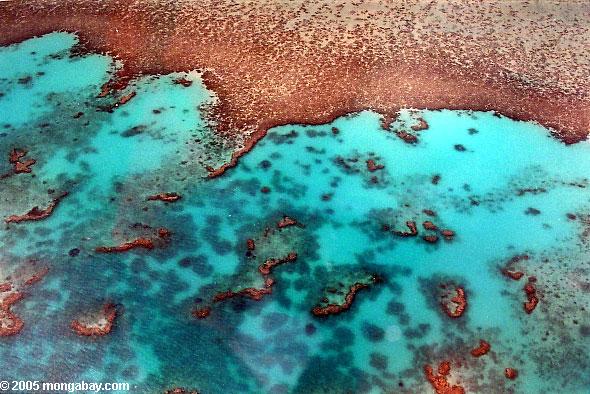
by Deep Green Resistance News Service | Sep 1, 2013 | Climate Change
By Jeremy Hance / Mongabay
As if ocean acidification and climate change weren’t troubling enough (both of which are caused by still-rising carbon emissions), new research published in Nature finds that ocean acidification will eventually exacerbate global warming, further raising the Earth’s temperature.
Scientists have long known that tiny marine organisms—phytoplankton—are central to cooling the world by emitting an organic compound known as dimethylsulphide (DMS). DMS, which contains sulfur, enters the atmosphere and helps seed clouds, leading to a global cooling effect. In fact, in the past scientists have believed that climate change may actually increase DMS emissions, and offset some global warming, but they did not take into account the impact of acidification.
Researchers, headed by Katharina Six with the Max Planck Institute for Meteorology, tested how acidification affects phytoplankton in the laboratory by lowering the pH (i.e. acidifying) in plankton-filled water tanks and measuring DMS emissions. When they set the ocean acidification levels for what is expected by 2100 (under a moderate greenhouse gas scenario) they found that cooling DMS emissions fell.
Plugging the results into global modeling system, Six says, “we get an extra warming of 0.23 to 0.48 degree Celsius from the proposed impact [by 2100],” adding that “less sulphur results in a warming of the Earth surface.” This creates a positive feedback loop that will likely have impacts that are anything but positive, according to scientists.
To date, the world has warmed approximately 0.8 degrees Celsius in the last century with a variety of impacts including worsening severe weather, rising sea levels, melting glaciers and sea ice, and imperiled species.
Six also notes that a warmer world does not necessarily mean a more productive world for phytoplankton as has been argued by researchers in the past.
“In former times it was assumed that phytoplankton potentially growth better in a warmer ocean,” she explained to mongabay.com. “However, the basis for plant growth is the supply with nutrients. As the oceans will stabilize in the warmer climate, fewer nutrients will be transported into the sunlight zone. Earth system models, like the MPI-ESM that was used for our study, project a decrease in primary production of 17 percent at the end of this century for a moderate climate scenario. The impact from climate change alone led to a decrease in DMS emission of 7 percent.”
The results are still preliminary as researchers have yet to test how DMS emissions will by impacted in tropical and subtropical waters, focusing to date on polar and temperate waters. In addition, further modeling should be done in order to understand possible uncertainties according to Six.
Still, the evidence is strong enough that the researchers write in the paper that “this potential climate impact mechanism of ocean acidification should be considered in projections of future climate change.” Essentially raising current estimates for a moderate climate scenario by around 10 percent.
Ocean acidification, which has been dubbed “climate change’s equally evil twin” by U.S. National Oceanic and Atmospheric Administration (NOAA)’s Jane Lubchenco, is expected to have largely negative impacts on many marine species, including dissolving the shells of crustaceans and molluscs, hampering coral reefs, and even changing how far fish can hear.
So, how do we stop this from happening?
“There is only one answer,” Katharina Six told mongabay.com, “the abatement of fossil fuel emissions.”
From Mongabay: “Bad feedback: ocean acidification to worsen global warming“

by Deep Green Resistance News Service | Sep 1, 2013 | Male Violence
By Ben Barker / Deep Green Resistance Wisconsin
I wish this was just a nightmare. My friend is gone and I want her back. She was killed several weeks ago—violently, sadistically, suddenly—and for several weeks I’ve been crying. My head keeps shaking. I whisper to myself: “No. No. No.” Over and over. More than anything else right now, I want this to not be real. But it is the victim herself who would have been the first to remind me: men’s violence against women, the cruelty of this culture, is all too real.
The pain of the world has come home. What words could do it justice? I dredged some up to speak at her funeral, but even then this tragedy felt like a bad dream. It still does.
Just one night before her death, we were making dinner plans for the coming week. Just a few days before that, we were on the phone expressing how much we’ve missed one another. “I’m listening to Regina Spektor and thinking of you,” I said. “Aw, thank you for thinking of me,” she said. “I’d love to see you soon.”
After one unfathomable instance, after one piece of the most horrible of news, our plans are shattered, our relationship gone, my heart broken.
Jessie and I met because we both wanted to change the world; because we both believed that, in the words of a feminist writer we mutually admired, “there are certain kinds of pain that people should not have to endure.”
With her easy smile, a lot of laughter, and a propensity to start so many deeply profound conversations in one sitting, Jessie was a gust of wonder, passion, and beauty. She asked the big questions and, as best she could, tried to live out the answers every day. Her wish was only for others to try, too.
The personal and political were inseparable for Jessie. She was at once a musician, an activist, a daughter, and a friend. She was so much more than any one title could describe. And every aspect of who she was depended on the other; their coming together is what made her life as rich as it was, what made her as dynamic a person as she was, what moved her to change her corner of the world, as she did.
Together, we cooked, we walked in the woods, we talked politics, we talked relationships, we made music, we did activism. We were sternly serious and blissfully silly.
Jessie would sit at the piano and let the music of her life release. She asked me to sing along, which I feebly did. Meanwhile, not so feebly, I stood back and witnessed in awe the undeterred passion flowing out of my friend’s throat and fingertips. It gave me shivers and put tears in my eyes.
Her voice still thunders in my mind. Her songs still have me mesmerized. Her honest longing for justice still humbles me. Her courage in fighting for it still shows me a way to live my life.
Like so much that is alive and beautiful in this world, Jessie was stolen from us. She was a flame snuffed out by the very violence she strived to stop. She was vanished by hands of destruction: a fate Jessie firmly stood against when faced by vulnerable people and a vulnerable planet; a fate that came, in its unspeakable horror, to take her from her safest place, on some random morning.
It’s hard—near impossible—to piece together letters that come close to spelling the magnitude of how wrong this all is. The contrast of her life—which, in her last days, she said explicitly she was loving—and her death—which was cruel beyond sane human comprehension—is staggering. It is heart-breaking.
What can I do with this broken heart? Try as I may, wish as I might, nothing—not the recounting of memories, not the consoling conversations, not the longest of cries, not the steadfast declarations of activism, not the time spent with those who have loved her most and remind me of her most—will bring her back. So, what to do?
If Jessie’s life was made of music, she’d tell me to just keep singing along. She’d tell me, in the simple, honest terms she was so fond of, to simply keep trying; to try at life. As long as I’ve known her, I’ve been better for it. I’ve been encouraged to ask more questions, to be more loving, to sing more and worry less. Why stop now?
Little is as sobering as death. Its lesson is basic: take nothing for granted.
What good is this lesson without my friend? There’s no solace here, just truth in the most truthful sense; the truth that breaks hearts and buoys them.
The truth is I miss Jessie; I want her to be here. The truth is I’m still alive and I have to go on. The truth is I have, at every moment, the choice to embody the wonder and beauty and passion that she embodied.
What I can’t do—and will not do—is forget. Jessie, in life or death, cannot be distilled to a thirty-second news story. She is not just some girl from some small town whom some tragic thing happened to; the once living, now deceased, occasionally remembered. She is not just another victim with a fate too sad to mention.
This dissociating, this forgetting, is what allows us to carry on, quiet and complacent, in the face of glaring and devastating injustice. It is what allows the perpetrators to carry on, too.
The casualties of this culture far outnumber those who survive it. Each one has a story; friends and family in mourning; dreams and passions forever lost.
I want to tell Jessie’s story forever. I want to tell every story of every stolen life as much as I possibly can. I can’t forget Jessie—her laugh, her music, her political vigor, her sitting across the table from me on that night of the full moon—even if I wanted to. I can’t forget the hollow her death has created within me and within this world.
So, what do we do? What do we who love life and love justice and love Jessie do now? First we mourn; then we fight. And all the while, we keep the flames of our love alive: for each other, for this planet, for you, Jessie.
It is utterly stunning how, within the subtleties of a single relationship, we can find something so blazingly true and real and beautiful as to see in it the love that is the fabric of our world; a love worth living and dying for. When those subtleties, and the relationship itself, are stolen from us, it is the meaning of the whole world that shakes beneath us and, eventually, guides us forward. Such is precisely how precious life is.
As her father said, “Jessie’s death crystallizes things. There is a war between forces of life and death. We can either let a small group of people fight it out while the rest of us sit by, or we can get in there.”
Jessie’s kindness radiates still. Jessie’s fight is unfinished. To honor our dear friend, let us now love deeply, defend fiercely, and put an end to violence against women and the culture which fosters it.
I love you, Jessie, and I miss you more than words can explain. I had more to learn from you, more to experience alongside you, more love to give you.
First I’ll mourn. Then I’ll fight. All the while, I’ll love you.
Beautiful Justice is a monthly column by Ben Barker, a writer and community organizer from West Bend, Wisconsin. Ben is a member of Deep Green Resistance and is currently writing a book about toxic qualities of radical subcultures and the need to build a vibrant culture of resistance. He can be contacted at benbarker@riseup.net.


